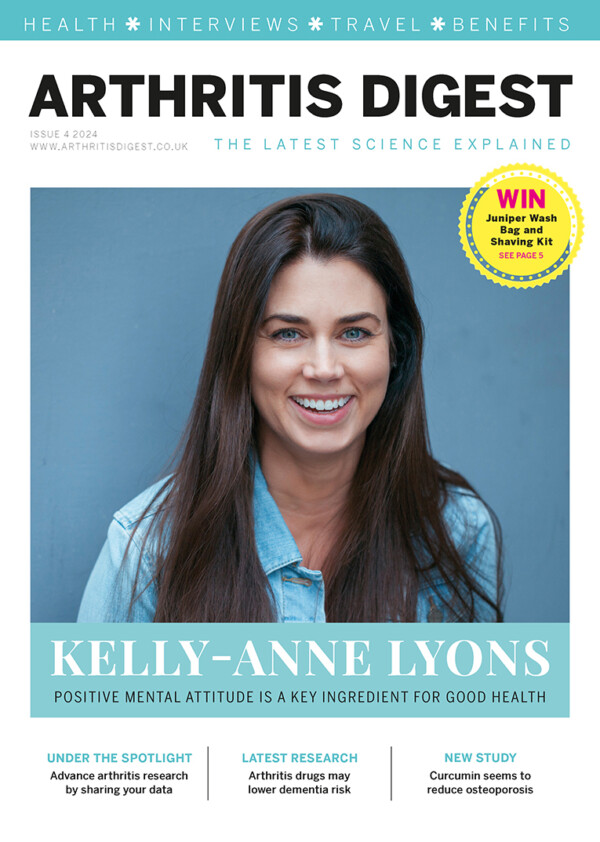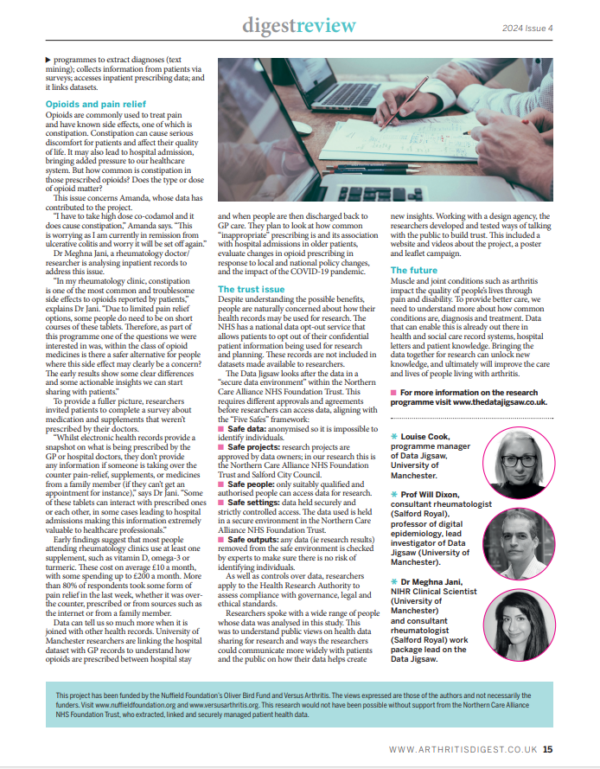The power of your data to advance arthritis research – Louise Cook, Prof Will Dixon and Dr Meghna Jani speak to Arthritis Digest magazine
Arthritis Digest is a magazine for people with arthritis that highlights the latest relevant research and reviews topical issues.
Continuing regular contributions from our Rheumatic and Musculoskeletal Diseases theme researchers, Louise Cook, Professor Will Dixon and Dr Meghna Jani explain how analysis of health data can help improve the lives and care of people living with arthritis.
Louise Cook is Programme Manager of Data Jigsaw at The University of Manchester.
Prof Will Dixon is a Consultant Rheumatologist at Salford Royal Hospital, part of Northern Care Alliance NHS Foundation Trust, and Professor of Digital Epidemiology and Lead Investigator of Data Jigsaw at The University of Manchester.
Dr Meghna Jani is an NIHR Clinical Scientist at The University of Manchester, Consultant Rheumatologist at Salford Royal Hospital and Work Package Lead on the Data Jigsaw.

Left to right: Louise Cook, Prof Will Dixon, Dr Meghna Jani
Arthritis Digest readers know all about the impact of arthritis and other musculoskeletal problems. You live with the pain and discomfort that is common in these conditions. You know how your condition impacts on your function; sometimes you may need help and support for even simple tasks. You may have struggled to get diagnosed in the first place. The desire to take some positive action might lead you to pay for a range of supplements. Your prescribed treatment options may feel like a lottery. Everyone has their own story to tell, and their own challenges of living with arthritis.
“When someone is in pain or unable to get about easily they will try anything,” highlights Julie, research participant and patient. “Unfortunately, people can waste a lot of money on trying to ease their pain whilst waiting for actual treatment.”

Health research attempts to improve some of these problems by looking at data across lots of patients and pooling the experiences of people living with arthritis. Analysis of health data can help us understand how commonly diseases occur, guiding the planning and provision of the right level of arthritis care. It can help us understand the benefits and harms of treatments, informing better decision making between patients and healthcare professionals.
These are exciting times for people in health research. Television, radio, newspapers and magazines are swelling with stories about how modern technology will further advance health research. Artificial intelligence (AI) promises to efficiently scan thousands of images without getting tired, picking up changes that expert clinicians can sometimes miss. It offers earlier detection of disease by seeing the signals of early onset of symptoms, perhaps through the pattern of consultations with your GP before you receive the diagnosis from a hospital specialist.
Under the spotlight
Forty years ago, most information within the NHS about your health was written on pieces of paper tucked into small envelopes or held in a folder: your health record. Over recent decades, this information became digital. Your GP records information about your consultation using an Electronic Health Record (EHR). They prescribe your medication electronically, request investigations electronically and make hospital referrals electronically.
Hospital specialists increasingly record information in electronic health records. Blood tests, X-rays, CT and MRI scans are digital. If you access social care via the council, information about the type of help you receive and how often, is held in your Digital Care Record.
Once stripped of identifiable information such as names, addresses and dates of birth, and if looked after sensitively and securely, researchers can access health and social care data across large populations of people, ultimately to improve the health and care of future patients.

Data jigsaw
A research team from The University of Manchester, led by Prof Will Dixon, is unlocking the power of this type of routinely collected data for health research. After talking with patients, the team identified questions they wanted to answer:
- How commonly does inflammatory arthritis occur?
- How often are over-the-counter treatments and pain-relieving medications used, and how safe are they?
- Which opioids are more likely to cause side-effects such as constipation and delirium?
- How much support do people living with arthritis have from their local council, family and friends?
- Can we use AI to help with the earlier diagnosis of axial spondyloarthritis (an inflammatory arthritis most often in the spine)?
The Data Jigsaw research programme pieces together information that allows these questions to be addressed. How? It takes hospital outpatient letters and applies computer programmes to extract diagnoses (text mining); collects information from patients via surveys; accesses inpatient prescribing data; and it links datasets.
Opioids and pain relief
Opioids are commonly used to treat pain and have known side effects, one of which is constipation. Constipation can cause serious discomfort for patients and affect their quality of life. It may also lead to hospital admission, bringing added pressure to our healthcare system. But how common is constipation in those prescribed opioids? Does the type or dose of opioid matter?
This issue concerns Amanda, whose data has contributed to the project.
“I have to take high dose co-codamol and it does cause constipation,” Amanda says. “This is worrying as I am currently in remission from ulcerative colitis and worry it will be set off again.”
Dr Meghna Jani, a rheumatology doctor/researcher is analysing inpatient records to address this issue.
“In my rheumatology clinic, constipation is one of the most common and troublesome side effects to opioids reported by patients,” explains Dr Jani. “Due to limited pain relief options, some people do need to be on short courses of these tablets. Therefore, as part of this programme one of the questions we were interested in was, within the class of opioid medicines is there a safer alternative for people where this side effect may clearly be a concern? The early results show some clear differences and some actionable insights we can start sharing with patients.”

To provide a fuller picture, researchers invited patients to complete a survey about medication and supplements that weren’t prescribed by their doctors.
“Whilst electronic health records provide a snapshot on what is being prescribed by the GP or hospital doctors, they don’t provide any information if someone is taking over the counter pain-relief, supplements, or medicines from a family member (if they can’t get an appointment for instance),” says Dr Jani. “Some of these tablets can interact with prescribed ones or each other, in some cases leading to hospital admissions making this information extremely valuable to healthcare professionals.”
Early findings suggest that most people attending rheumatology clinics use at least one supplement, such as vitamin D, omega-3 or turmeric. These cost on average £10 a month, with some spending up to £200 a month. More than 80% of respondents took some form of pain relief in the last week, whether it was over the counter, prescribed or from sources such as the internet or from a family member.
Data can tell us so much more when it is joined with other health records. University of Manchester researchers are linking the hospital dataset with GP records to understand how opioids are prescribed between hospital stay and when people are then discharged back to GP care. They plan to look at how common “inappropriate” prescribing is and its association with hospital admissions in older patients, evaluate changes in opioid prescribing in response to local and national policy changes, and the impact of the COVID-19 pandemic.
The trust issue
Despite understanding the possible benefits, people are naturally concerned about how their health records may be used for research. The NHS has a national data opt-out service that allows patients to opt out of their confidential patient information being used for research and planning. These records are not included in datasets made available to researchers.
The Data Jigsaw looks after the data in a “secure data environment” within the Northern Care Alliance NHS Foundation Trust. This requires different approvals and agreements before researchers can access data, aligning with the “Five Safes” framework:
- Safe data: anonymised so it is impossible to identify individuals.
- Safe projects: research projects are approved by data owners; in our research this is the Northern Care Alliance NHS Foundation Trust and Salford City Council.
- Safe people: only suitably qualified and authorised people can access data for research.
- Safe settings: data held securely and strictly controlled access. The data used is held in a secure environment in the Northern Care Alliance NHS Foundation Trust.
- Safe outputs: any data (ie research results) removed from the safe environment is checked by experts to make sure there is no risk of identifying individuals.
As well as controls over data, researchers apply to the Health Research Authority to assess compliance with governance, legal and ethical standards.
Researchers spoke with a wide range of people whose data was analysed in this study. This was to understand public views on health data sharing for research and ways the researchers could communicate more widely with patients and the public on how their data helps create new insights. Working with a design agency, the researchers developed and tested ways of talking with the public to build trust. This included a website and videos about the project, a poster and leaflet campaign.
The future
Muscle and joint conditions such as arthritis impact the quality of people’s lives through pain and disability. To provide better care, we need to understand more about how common conditions are, diagnosis and treatment. Data that can enable this is already out there in health and social care record systems, hospital letters and patient knowledge. Bringing the data together for research can unlock new knowledge, and ultimately will improve the care and lives of people living with arthritis.
For more information on the research programme visit www.thedatajigsaw.co.uk.
This project has been funded by the Nuffield Foundation’s Oliver Bird Fund and Versus Arthritis. The views expressed are those of the authors and not necessarily the funders.
This research would not have been possible without support from the Northern Care Alliance NHS Foundation Trust, who extracted, linked and securely managed patient health data.